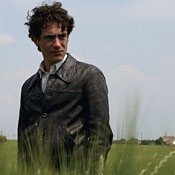- REVIEW
- READER REVIEWS
My Brother Is an Only Child (Mio fratello è figlio unico)
|
|
Genre
Comedy
Producer
Marco Chimenz
Distributor
ThinkFilm
Release Date
Mar 28, 2008
Release Notes
NY
Official Website
Review
Despair over the absence of the father fuels an enormous number of American films, including Shotgun Stories, which blames Dad for the war of brother against brother. In Italian movies, boys fight right under Dad’s nose, and what can he do? The country is lousy with brothers fighting brothers! In My Brother Is an Only Child, which is set in the sixties and seventies, the older sibling becomes a Communist, the younger a Fascist, and the two of them brawl all through the film. The script is co-written by director Daniele Luchetti and Sandro Petraglia and Stefano Rulli, who wrote the six-hour epic The Best of Youth—which also focused on two brothers and their divergent political paths. In my review of that film I wrote, “No, it’s not what you’re thinking: brother against brother, one a Fascist and the other a Communist hippie. It’s nothing so clichéd or allegorical or extreme in the manner of Bertolucci’s 1900.” Luchetti , Petraglia, and Rulli, must have missed that review—they turned around and made a beeline for the clichés.
Or maybe they set out to pull the rug out from under potential critics. What makes My Brother Is an Only Child so alive and entertaining is how it dramatizes the endless tug-of-war between political conviction and personal experience—the way the lines twist and blur and finally implode. Accio (Vittorio Emanuele Propizio at 13, Elio Germano postpuberty) begins by striving to be a priest but is annoyed that pleasuring oneself is a sin that requires absolution. He does not want to be absolved. He wants girls. But it’s his heartthrob older brother, Manrico (Riccardo Scamarcio), who’s the babe- magnet as well as the favorite of Mom and the charismatic Communist proselytizer. So jealous Accio starts hanging out with an avuncular Fascist merchant, Mario (Luca Zingaretti), and poring over Mussolini picture books. He announces, “I want to redeem the lost honor of the revolution.” Fascists aren’t too popular in this factory town, though, and Accio is routinely disparaged by his mom, dad, and sister Violetta (Alba Rohrwacher) … until his sister’s boyfriend jilts her and she asks him for a favor. “A Fascist in the family is always handy,” says Accio.
It isn’t long before Accio’s fellow Fascists get a little too unruly and the Communists start shooting at the factory owners and it’s time for our protagonist to say a plague on both your houses. The best scene is a black-comic masterpiece: Manrico and a Communist conductor “de-fascistize” Beethoven’s “Ode to Joy” by replacing the Almighty with Mao, Marx, Lenin, and Stalin. As the left-wing audience drinks it in, the Fascists begin to gather in the back like the birds on the monkey bars in Hitchcock’s The Birds. “Leave Beethoven alone or we’ll bust your ass!” they snarl.
Publicity for My Brother Is an Only Child likens the film to early works of Bertolucci and Marco Bellocchio—which is mystifying, since those movies were made in the middle of the cultural mêlée. This one maintains an ironic distance. I like my Italian political film messier and more abrasive—and less slighting to the actual politics. But its mischievous skepticism—doubtless the result of watching good people suffer at the hands of mindless ideologues—is a kick.
